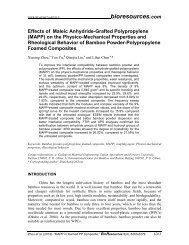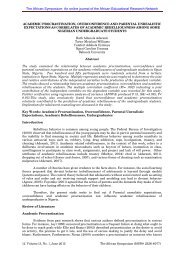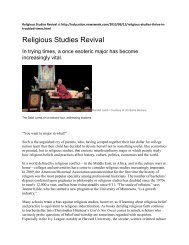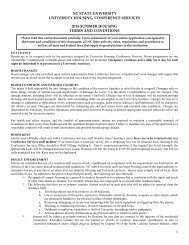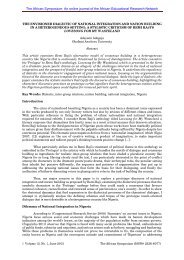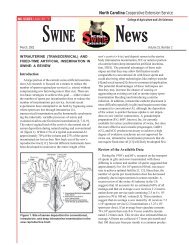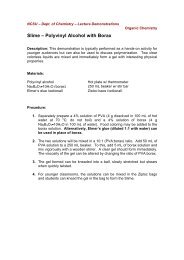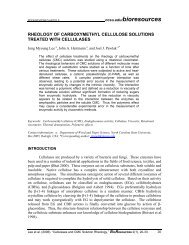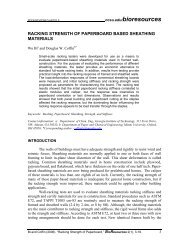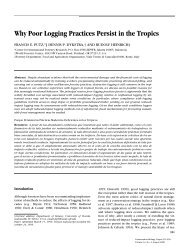Dictators, Songwriters, and the Negotiation of Censorship
Dictators, Songwriters, and the Negotiation of Censorship
Dictators, Songwriters, and the Negotiation of Censorship
Create successful ePaper yourself
Turn your PDF publications into a flip-book with our unique Google optimized e-Paper software.
Wilson<br />
bonus tracks, restoring <strong>the</strong> concept album to its original design.<br />
Fur<strong>the</strong>rmore, <strong>the</strong> original version <strong>of</strong> lyrics that were modified have, in <strong>the</strong><br />
wake <strong>of</strong> <strong>the</strong> dictatorship, now been disclosed. These artifacts, along with<br />
<strong>the</strong> restored songs are a valuable primary source, allowing one to get a very<br />
clear idea <strong>of</strong> what was <strong>and</strong> was not possible for an artist in <strong>the</strong> charged<br />
political climate <strong>of</strong> <strong>the</strong> day. An examination <strong>of</strong> <strong>the</strong> songs that were cut<br />
versus those that remained, along with a comparison <strong>of</strong> <strong>the</strong> original<br />
censored lyrics with <strong>the</strong> revised version will illustrate <strong>the</strong> evolution <strong>of</strong> <strong>the</strong><br />
new poetic discourse.<br />
According to <strong>the</strong> artists, this pruning had deleterious effects on <strong>the</strong><br />
quality <strong>of</strong> this production that was to be Argentina’s first concept album.<br />
Charly García says that “si hubiera salido como era, ¡habría sido tremendo!<br />
La idea original del disco era poner una canción para la policía, otra para el<br />
ejército, otra habl<strong>and</strong>o de la familia [etc]. Era muy fuerte” (Dente 68).<br />
Though <strong>the</strong> musicians claim that <strong>the</strong> final product was not what <strong>the</strong>y had<br />
intended, Anécdotas was very well received by <strong>the</strong> critics: <strong>the</strong> magazine<br />
Pelo called it “el mejor album de Sui Generis, un gran logro para el rock del<br />
sur” (Historia del rock argentino). The magazine’s commentator even lauds<br />
<strong>the</strong> group—in a veiled manner—for its skill in dealing with <strong>the</strong> censors.<br />
“Quizás haya algunas canciones ausentes (a nivel letras), pero las que están<br />
le dan aún más validez a las que no pudieron revistar.” It was favorably<br />
received by <strong>the</strong> public as well; selling thirty-five thous<strong>and</strong> copies, it was one<br />
<strong>of</strong> <strong>the</strong> best selling Argentine rock records <strong>of</strong> its day. The artists <strong>the</strong>mselves<br />
were not quite as pleased with <strong>the</strong> result, explaining some years later that<br />
<strong>the</strong> album lost a good deal <strong>of</strong> its original meaning due to <strong>the</strong> censorship.<br />
“‘El show de los muertos’, puesto después de ‘Tango en segunda’, perdió<br />
buena parte de su sentido, porque en realidad antes tenía que estar después<br />
de ‘Juan Represión’, el que tuvimos que dejar afuera,” Mestre said in <strong>the</strong><br />
mid-80s. This need for writing <strong>and</strong> rewriting <strong>of</strong>ten angered b<strong>and</strong> members<br />
<strong>and</strong> sometimes led to conflict with producers. Explaining an odd little song<br />
that does not seem to fit with <strong>the</strong> rest <strong>of</strong> <strong>the</strong> album’s <strong>the</strong>me, Charly García<br />
said, in an interview ten years after <strong>the</strong> album’s release,<br />
60



